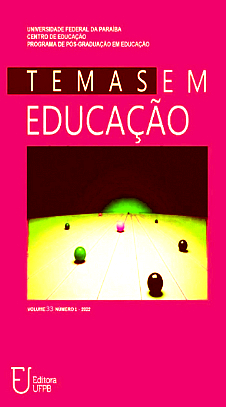Elaboração e implementação da Telessimulação Síncrona e Observacional no Ensino em Enfermagem: relato de experiência
DOI:
https://doi.org/10.22478/ufpb.2359-7003.2024v33n1.69956Keywords:
Treinamento por simulação, Enfermagem, Educação à distânciaAbstract
Este estudo objetiva relatar a experiência da elaboração e implementação de um workshop telessimulado sobre ressuscitação cardiopulmonar no adulto com suporte básico de vida no ambiente intra-hospitalar para estudantes de enfermagem. Trata-se de um relato de experiência que descreve a realização de um workshop telessimulado, de caráter síncrono e observacional, realizado com sete estudantes de enfermagem entre os meses de junho e julho de 2023. O workshop foi dividido em dez etapas: planejamento, divulgação e consentimento do participante; inscrição e caracterização dos estudantes de enfermagem; pré-simulação; apresentação dos facilitadores do workshop e pré-teste; treinamento de habilidades; pré-briefing/briefing; execução do cenário telessimulado; teledebriefing; pós-teste e; aprendizagem adicional. Com base na comparação das médias do pré e pós-teste, observou-se um aumento do número de acertos entre os testes, evidenciando resultados satisfatórios e potentes ao aprendizado, tornando a telessimulação síncrona e observacional como uma nova oportunidade na formação em saúde.
Downloads
References
AMERICAN HEART ASSOCIATION. Destaques das diretrizes de RCP e ACE de 2020 da American Heart Association. Disponível em: https://cpr.heart.org/-/media/cpr-files/cpr-guidelines-files/highlights/hghlghts_2020eccguidelines_portuguese.pdf. Acesso em: 01 Fev. 2024.
ALVES, M. G., PEREIRA, V. O. S.; BATISTA, D. F. G.; CORDEIRO, A. L. P. C.; NASCIMENTO, J. S. G.; DARLI, M. C. B. Construction and validation of a questionnaire for cardiopulmonary resuscitation knowledge assessment. Cogitare Enferm, v. 24, 2019.
BERNARDINELLI, F. C. P.; AMORIM, G. C.; NASCIMENTO, J. S. G.; FONSECA, L. M. M.; DOMINGUES, T. A. M.; CONDELES, P. C.; et al. Desenvolvimento de um design de telessimulação para o suporte básico de vida. Acta Paul Enferm, v. 37, p. eAPE00021, 2024.
BERNARDINELLI, F. C. P.; NASCIMENTO, J. S. G.; NASCIMENTO, K. G.; AMORIM, G. C.; SILVA, A. D.; CHAVAGLIA, S. R. R. Telessimulação síncrona e observacional em saúde: scoping review. Texto contexto – enferm., v. 32, 2023a.
BERNARDINELLI, F. C. P.; NASCIMENTO, J. S. G.; NASCIMENTO, K. G.; AMORIM, G. C.; SILVA, S. A.; CHAVAGLIA, S. R. R. Prática da telessimulação no ensino e aprendizagem em saúde: revisão de escopo. Rev enferm UERJ, v. 30, p. e67137, 2022.
DIAZ, M. C. G.; WALSH, B. M. Telesimulation-based education during COVID-19. Clin Teach. 2020.
DOMINGUES, A. N.; HILÁRIO, J. S. M.; MELLO, D. F.; MORENO, A. I. P.; FONSECA, L. M. M. Telessimulação sobre visita domiciliar e cuidado infantil: facilidades, barreiras e percepções de estudantes de enfermagem. Rev. Latino-Am. Enfermagem, Ribeirão Preto, v. 30, 2022.
IFEDAYO, A. E.; ZIDEN, A. A.; ISMAIL, A. B. Podcast acceptance for pedagogy: the levels and significant influences. Heliyon, v. 7, n. 3, p. e06442, 2021.
KURJI, Z.; AIJAZ, A.; AIJAZ, A.; JETHA, Z.; CASSUM, S. Telesimulation Innovation on the Teaching of SPIKES Model on Sharing Bad News. Asia Pac J Oncol Nurs, v. 8, p. 623-7, 2021.
MARTINS, F. S. L.; BORGES, R. M.; SOUZA, D. W.; SILVEIRA, N. K. S.; CAREGNATO, R. C. A. Telessimulação na área da saúde: revisão integrativa. Revista Eletrônica Acervo Saúde. v. 15, n. 3, p. 1-11, 2022.
McCOY, C. E.; ALRABAH, R.; WEICHMANN, W.; LANGDORF, M. I.; RICKS, C.; CHAKRAVARTHY, B.; et al. Feasibility of Telesimulation and Google Glass for Mass Casualty Triage Education and Training. West J Emerg Med. v. 20, n. 3, p. 512-9, 2019.
McCOY, C. E.; SAYEGH, J.; ALRABAH, R.; YARRIS, L. M. Telesimulation: An Innovative Tool for Health Professions Education. AEM Educ Train, Medford, v. 1, n. 2, p. 132-6, 2017.
NAIK, N.; FINKELSTEIN, R. A.; HOWELL, J.; RAJWANI, K.; CHING, K. Telesimulation for COVID-19 Ventilator Management Training With Social-Distancing Restrictions During the Coronavirus Pandemic. Simulation & Gaming, v. 51, n. 4, 2020.
NASCIMENTO, J. S. G.; OLIVEIRA, J. L. G.; ALVES, M. G.; BRAGA, F. T. M. M.; GÓES, F. S. N.; DALRI, M. C. B. Métodos e técnicas de debriefing utilizados em simulação na enfermagem. Rev Gaúcha Enferm, Porto Alegre, v. 41, p. 20190182, 2020.
OKRAINEC, A.; HENAO, O.; AZZIE, G. Telesimulation: an effective method for teaching the fundamentals of laparoscopic surgery in resource-restricted countries. Surg Endosc, v. 24, n. 2, p. 417-22, 2009.
O’RAE, A.; FERREIRA, C.; HNATYSHYN, T.; KRUT, B. Family nursing telesimulation: Teaching therapeutic communication in an authentic way. Teach Learn Nurs, v. 16, n. 4, p. 404-9, 2021.
PATEL, S. M.; MILLER, C. R.; SCHIAVI, A.; TOY, S.; SCHWENGEL, D. A. The sim must go on: adapting resident education to the COVID-19 pandemic using telesimulation. Adv Simul (Lond), v. 5, p. 26, 2020.
THOMAS, A.; BURNS, R.; SANSEUAU, E.; AUERBACH, M. Tips for Conducting Telesimulation-Based Medical Education. Cureus, v. 13, n. 1, p. e12479, 2021.
YANG, T.; BUCK, S.; EVANS, L.; AUERBACH, M. A Telesimulation Elective to Provide Medical Students With Pediatric Patient Care Experiences During the COVID Pandemic. Pediatr Emerg Care, v. 37, n. 2, p. 119-22, 2021.
Downloads
Published
How to Cite
Issue
Section
License
Copyright (c) 2024 Revista Temas em Educação

This work is licensed under a Creative Commons Attribution 4.0 International License.
Authors who publish in this journal agree to the following terms:
. Authors retain the copyright and grant the journal the right to first publication, with the work simultaneously licensed under the Licença Creative Commons Attribution that allows the sharing of the work with acknowledgment of authorship and initial publication in this magazine. . Authors are authorized to assume additional contracts separately, for non-exclusive distribution of the version of the work published in this journal (eg, publishing in institutional repository or as a book chapter), with acknowledgment of authorship and initial publication in this journal.
. Authors are permitted and encouraged to publish and distribute their work online (eg in institutional repositories or on their personal page) at any point before or during the editorial process, as this can generate productive changes, as well as increase impact and citation of the published work (See O Efeito do Acesso Livre).



















